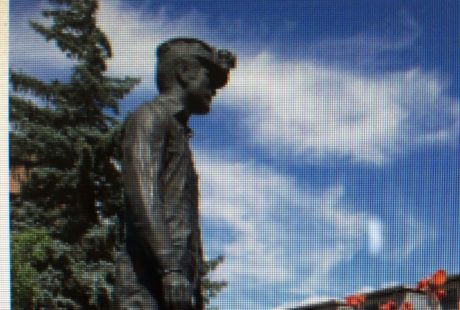Blog - Page 2 of 2 - Memories in Motion
16
Jun
Poetry: One Language for the Unspeakable
- By Eileen Vandergrift
- No Comments
As a follow up to my thoughts about terror, trauma and the potential for absorbing, and even growing through, unimaginable loss…I wanted to share a poem that spoke to me of, what I think may be the grandest of human accomplishments…kindness.
Kindness by: Naomi Shihab Nye
Before you know what kindness really is
you must lose things,
feel the future dissolve in a moment
like salt in a weakened broth.
What you held in your hand,
what you counted and carefully saved,
all this must go so you know
how desolate the landscape can be
between the regions of kindness.
How you ride and ride
thinking the bus will never stop,
the passengers eating maize and chicken
will stare out the window forever.
Before you learn the tender gravity of kindness,
you must travel where the Indian in a white poncho
lies dead by the side of the road.
You must see how this could be you,
how he too was someone
who journeyed through the night with plans
and the simple breath that kept him alive.
Before you know kindness as the deepest thing inside,
you must know sorrow as the other deepest thing.
You must wake up with sorrow.
You must speak to it till your voice
catches the thread of all sorrows
and you see the size of the cloth.
Then it is only kindness that makes sense anymore,
only kindness that ties your shoes
and sends you out into the day to mail letters and purchase bread,
only kindness that raises its head
from the crowd of the world to say
It is I you have been looking for,
and then goes with you everywhere
like a shadow or a friend.
16
Jun
Terror…Trauma…Truth
- By Eileen Vandergrift
- 4 Comments
In the aftermath of this most recent experience of terror in Orlando, it is hard to find “useful” thoughts to share. Still, I think it might be important to remember that, when words fail to hold larger-than-life-losses, we have entered the realm of ‘trauma’ and that we can be traumatized by losses well beyond those immediately-our-own. Trauma, a word used generally as well as psychologically, suggests that a loss, so great as to be ‘unprocessable’, must find it’s way into consciousness through other routes. Terror traumatizes all of us because it reveals a most basic way in which every being on the planet is vulnerable to losing things that cannot be fully anticipated. We cannot control or protect against many losses no matter how hard we try! When terror confronts us, (close in or at a distance) we feel traumatized, at least in part, because it shines a light on one fundamental way in which we are all deeply connected to one another by the very experience of our human vulnerability. No one imagines that THEY will be dancing in a Night Club and, without a moments notice, have to find cover in a bathroom stall, playing dead in the effort to avert their own death…yet, every traumatic loss tells a story just like that. Few of us give much thought to the fact that the lives we are living can be lost in a moment (let alone how, under what circumstances and what that loss could require of us). Despite this, we are forever vulnerable to the fact that, one day, exactly that could happen. It is a very difficult to absorb, or believe, dimension of our shared human condition. Perhaps, to live in the assumed-everyday-world most of us have to suspend, as best we can, an awareness of our vulnerability just to keep moving forward. Despite this, when traumatic things happen to us, or those around us, our ability to remain “unaware” of our vulnerability is shaken and our shared connection, through the myriad of life’s inevitable losses is highlighted. Sometimes, if we can share these awful moments and use them to the recognize deep truths of our shared humanity, we can grow, even through things that are deforming.
06
Jun
Sunday Wanderings
- By Eileen Vandergrift
- 6 Comments
 Yesterday I spent the afternoon ‘exploring’ a little community near my new hometown of Boulder. On the main street, busy with shops, cafes and more gloriously stalky flowers than I could even name, there was a bigger than life bronze dedicated to the town’s coal miners. The plaque read…” TO LIVE IN THE HEARTS WE LEAVE BEHIND IS NOT TO DIE”. While this sentiment is ‘familiar ‘ enough, I’m trying to think about HOW we can be an ‘afterlife’ for those who have shaped us and still be open to the shaping of memory that goes on well beyond their lives with us?
Yesterday I spent the afternoon ‘exploring’ a little community near my new hometown of Boulder. On the main street, busy with shops, cafes and more gloriously stalky flowers than I could even name, there was a bigger than life bronze dedicated to the town’s coal miners. The plaque read…” TO LIVE IN THE HEARTS WE LEAVE BEHIND IS NOT TO DIE”. While this sentiment is ‘familiar ‘ enough, I’m trying to think about HOW we can be an ‘afterlife’ for those who have shaped us and still be open to the shaping of memory that goes on well beyond their lives with us?
Maybe, if we are going to have an ongoing relationship with people who are no longer with us concretely, we have to remember that it requires us to hold them in memory as we actually experienced them so that we can return, sometimes again and again, to moments with them whose meanings keeps developing as we do.
Resisting the pressure, from ourselves and others, to remember people simply… ‘good’, ‘bad’, ‘this’, ‘that’… protects memory as a living possibility for connection to what we might still have to learn through our lost relationships.
While uncomplicated stories may be convenient, I think that they inevitably lack the richness of our ‘real relationships’ with complex people. If we want to feel a lively connection to someone, even in their absence, I think the remembrance of them has to be faithful to who they actually were. I imagine that a lot of us get ‘stuck’ in grief because we are trying to let go of an idea of a person rather than the person themselves.
What do you think???
23
May
Hello People!
- By Eileen Vandergrift
- 10 Comments
Let’s begin at the end and see how looking back actually offers a road forward! It’s Memorial Day, a bookmark for remembrance in the stories of our lives. I think of it as an opportunity to challenge old notions of memory in ways that enliven us. There are as many ways to experience loss as there are people struggling to do just that. I hope you’ll join our conversation, in fact, I hope you’ll break it wide open. What have you lost? What do you grieve? Where are you stuck? What have you done that moved you forward? What have you not yet allowed yourself to say? Let’s wrestle with suffering in ways that make it work for us!
Longfellow asserted that “There is no grief like the grief that does not speak.” Speaking from your heart can be a radical act…put down the burden of your silence…join the conversation.




